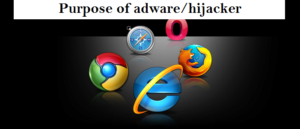How to remove BettingSiteDefender Adware
Easy methods to delete BettingSiteDefender Adware in Windows 10/8/7 computer
BettingSiteDefender is rough application or browser extension considered as adware. This application claims to help you to check blacklisted websites and prevents your browser from opening them. It might possible this application helps you in any cases. However, it is potentially unwanted application (PUA) designed to promote fake PC Protection/Adblocker software, fake technical support services, online scams, online games and/or other PUAs by running malicious advertisements campaigns. In sort, this rough application can’t be trusted.
BettingSiteDefender Adware displays malicious advertisements in the form of banners, coupons, notifications, fake security alert, fake software update alert, porn or adult related ads/contents, and other types of advertisements. It doesn’t matter whether this application or your browser is closed or opened. These malicious advertisements can also be appeared in your Windows desktop even when your browser or this rough application is closed. It is not easy task for you to close or delete these advertisements one-by-one in computer. Clicking ads by this rough application may lead to severe privacy issues, malware or viruses infections in computer, or even identity theft.
Ads by BettingSiteDefender might malicious and can trigger PUAs, adware or malware in your computer once clicked. It is not safe to click on any hyperlinks/buttons or advertisements displayed by this nasty application. It also attempts to install other fake browser extension, BHOs (browser helper objects), plug-ins, add-ons or toolbars in your browser. These fake BHOs or extensions are considered as browser hijacker designed to make several unwanted modifications in your browser’s settings without your knowledge. It also blocks you from revert these changes means you can’t undo the changes made.
BettingSiteDefender adware also has data tracking capability. They can monitor your online habits and collect your browsing-related data or other sensitive information. They can collect your some information such as IP address, URLs search, login ID & password of your various online accounts, banking information and more details. These collected data can be shared with other attackers or third-party to generate some income from them. In other words, this rough application is not safe for your online privacy & system security. So, it is important to find and remove BettingSiteDefender related files in computer.
How did you get BettingSiteDefender adware in Windows computer?
In some cases, PUAs or malware are distributed through unofficial/untrustworthy websites, fake software downloaders, installers or updaters, and other third-party sources. PUAs can also be distributed through other software package as additional offers. This false marketing method of packaging regular software with PUAs, adware or malware is known as Software Bundling Method – the mostly used mechanism by cybercriminals. If you ignore all terms & conditions given in software installation setup and skip ‘Custom/Advanced/Manual’ settings, then you install all additional programs included in software package into computer and this way, all malicious additions can also be installed. PUAs or malware can also be distributed through malicious advertisements campaigns that are designed to run certain codes/scripts.
How to protect your system against PUAs, adware or malware?
It is strongly recommended not download, install or purchase any applications from unofficial/unsafe websites, fake software downloaders, installers or updaters, and other third-party sources. All software should be downloaded from official and verified sources or via direct links, and choose always ‘Custom/Advanced/Manual’ installation if you want to avoid all malicious additions included in software package setup. Also, you should keep up-to-date your operating system and all other software installed in computer, and run regular system scan for malware or viruses with some powerful antivirus software in computer that could help you to find and remove all threats in computer.
Special Offer (For Windows)
BettingSiteDefender can be creepy computer infection that may regain its presence again and again as it keeps its files hidden on computers. To accomplish a hassle free removal of this malware, we suggest you take a try with a powerful Spyhunter antimalware scanner to check if the program can help you getting rid of this virus.
Do make sure to read SpyHunter’s EULA, Threat Assessment Criteria, and Privacy Policy. Spyhunter free scanner downloaded just scans and detect present threats from computers and can remove them as well once, however it requires you to wiat for next 48 hours. If you intend to remove detected therats instantly, then you will have to buy its licenses version that will activate the software fully.
Special Offer (For Macintosh) If you are a Mac user and BettingSiteDefender has affected it, then you can download free antimalware scanner for Mac here to check if the program works for you.
Antimalware Details And User Guide
Click Here For Windows Click Here For Mac
Important Note: This malware asks you to enable the web browser notifications. So, before you go the manual removal process, execute these steps.
Google Chrome (PC)
- Go to right upper corner of the screen and click on three dots to open the Menu button
- Select “Settings”. Scroll the mouse downward to choose “Advanced” option
- Go to “Privacy and Security” section by scrolling downward and then select “Content settings” and then “Notification” option
- Find each suspicious URLs and click on three dots on the right side and choose “Block” or “Remove” option

Google Chrome (Android)
- Go to right upper corner of the screen and click on three dots to open the menu button and then click on “Settings”
- Scroll down further to click on “site settings” and then press on “notifications” option
- In the newly opened window, choose each suspicious URLs one by one
- In the permission section, select “notification” and “Off” the toggle button

Mozilla Firefox
- On the right corner of the screen, you will notice three dots which is the “Menu” button
- Select “Options” and choose “Privacy and Security” in the toolbar present in the left side of the screen
- Slowly scroll down and go to “Permission” section then choose “Settings” option next to “Notifications”
- In the newly opened window, select all the suspicious URLs. Click on the drop-down menu and select “Block”

Internet Explorer
- In the Internet Explorer window, select the Gear button present on the right corner
- Choose “Internet Options”
- Select “Privacy” tab and then “Settings” under the “Pop-up Blocker” section
- Select all the suspicious URLs one by one and click on the “Remove” option

Microsoft Edge
- Open the Microsoft Edge and click on the three dots on the right corner of the screen to open the menu
- Scroll down and select “Settings”
- Scroll down further to choose “view advanced settings”
- In the “Website Permission” option, click on “Manage” option
- Click on switch under every suspicious URL

Safari (Mac):
- On the upper right side corner, click on “Safari” and then select “Preferences”
- Go to “website” tab and then choose “Notification” section on the left pane
- Search for the suspicious URLs and choose “Deny” option for each one of them

Manual Steps to Remove BettingSiteDefender:
Remove the related items of BettingSiteDefender using Control-Panel
Windows 7 Users
Click “Start” (the windows logo at the bottom left corner of the desktop screen), select “Control Panel”. Locate the “Programs” and then followed by clicking on “Uninstall Program”

Windows XP Users
Click “Start” and then choose “Settings” and then click “Control Panel”. Search and click on “Add or Remove Program’ option

Windows 10 and 8 Users:
Go to the lower left corner of the screen and right-click. In the “Quick Access” menu, choose “Control Panel”. In the newly opened window, choose “Program and Features”

Mac OSX Users
Click on “Finder” option. Choose “Application” in the newly opened screen. In the “Application” folder, drag the app to “Trash”. Right click on the Trash icon and then click on “Empty Trash”.

In the uninstall programs window, search for the PUAs. Choose all the unwanted and suspicious entries and click on “Uninstall” or “Remove”.

After you uninstall all the potentially unwanted program causing BettingSiteDefender issues, scan your computer with an anti-malware tool for any remaining PUPs and PUAs or possible malware infection. To scan the PC, use the recommended the anti-malware tool.
Special Offer (For Windows)
BettingSiteDefender can be creepy computer infection that may regain its presence again and again as it keeps its files hidden on computers. To accomplish a hassle free removal of this malware, we suggest you take a try with a powerful Spyhunter antimalware scanner to check if the program can help you getting rid of this virus.
Do make sure to read SpyHunter’s EULA, Threat Assessment Criteria, and Privacy Policy. Spyhunter free scanner downloaded just scans and detect present threats from computers and can remove them as well once, however it requires you to wiat for next 48 hours. If you intend to remove detected therats instantly, then you will have to buy its licenses version that will activate the software fully.
Special Offer (For Macintosh) If you are a Mac user and BettingSiteDefender has affected it, then you can download free antimalware scanner for Mac here to check if the program works for you.
How to Remove Adware (BettingSiteDefender) from Internet Browsers
Delete malicious add-ons and extensions from IE
Click on the gear icon at the top right corner of Internet Explorer. Select “Manage Add-ons”. Search for any recently installed plug-ins or add-ons and click on “Remove”.

Additional Option
If you still face issues related to BettingSiteDefender removal, you can reset the Internet Explorer to its default setting.
Windows XP users: Press on “Start” and click “Run”. In the newly opened window, type “inetcpl.cpl” and click on the “Advanced” tab and then press on “Reset”.

Windows Vista and Windows 7 Users: Press the Windows logo, type inetcpl.cpl in the start search box and press enter. In the newly opened window, click on the “Advanced Tab” followed by “Reset” button.

For Windows 8 Users: Open IE and click on the “gear” icon. Choose “Internet Options”

Select the “Advanced” tab in the newly opened window

Press on “Reset” option

You have to press on the “Reset” button again to confirm that you really want to reset the IE

Remove Doubtful and Harmful Extension from Google Chrome
Go to menu of Google Chrome by pressing on three vertical dots and select on “More tools” and then “Extensions”. You can search for all the recently installed add-ons and remove all of them.

Optional Method
If the problems related to BettingSiteDefender still persists or you face any issue in removing, then it is advised that your reset the Google Chrome browse settings. Go to three dotted points at the top right corner and choose “Settings”. Scroll down bottom and click on “Advanced”.

At the bottom, notice the “Reset” option and click on it.

In the next opened window, confirm that you want to reset the Google Chrome settings by click on the “Reset” button.

Remove BettingSiteDefender plugins (including all other doubtful plug-ins) from Firefox Mozilla
Open the Firefox menu and select “Add-ons”. Click “Extensions”. Select all the recently installed browser plug-ins.

Optional Method
If you face problems in BettingSiteDefender removal then you have the option to rese the settings of Mozilla Firefox.
Open the browser (Mozilla Firefox) and click on the “menu” and then click on “Help”.

Choose “Troubleshooting Information”

In the newly opened pop-up window, click “Refresh Firefox” button

The next step is to confirm that really want to reset the Mozilla Firefox settings to its default by clicking on “Refresh Firefox” button.
Remove Malicious Extension from Safari
Open the Safari and go to its “Menu” and select “Preferences”.

Click on the “Extension” and select all the recently installed “Extensions” and then click on “Uninstall”.

Optional Method
Open the “Safari” and go menu. In the drop-down menu, choose “Clear History and Website Data”.

In the newly opened window, select “All History” and then press on “Clear History” option.

Delete BettingSiteDefender (malicious add-ons) from Microsoft Edge
Open Microsoft Edge and go to three horizontal dot icons at the top right corner of the browser. Select all the recently installed extensions and right click on the mouse to “uninstall”

Optional Method
Open the browser (Microsoft Edge) and select “Settings”

Next steps is to click on “Choose what to clear” button

Click on “show more” and then select everything and then press on “Clear” button.

Conclusion
In most cases, the PUPs and adware gets inside the marked PC through unsafe freeware downloads. It is advised that you should only choose developers website only while downloading any kind of free applications. Choose custom or advanced installation process so that you can trace the additional PUPs listed for installation along with the main program.
Special Offer (For Windows)
BettingSiteDefender can be creepy computer infection that may regain its presence again and again as it keeps its files hidden on computers. To accomplish a hassle free removal of this malware, we suggest you take a try with a powerful Spyhunter antimalware scanner to check if the program can help you getting rid of this virus.
Do make sure to read SpyHunter’s EULA, Threat Assessment Criteria, and Privacy Policy. Spyhunter free scanner downloaded just scans and detect present threats from computers and can remove them as well once, however it requires you to wiat for next 48 hours. If you intend to remove detected therats instantly, then you will have to buy its licenses version that will activate the software fully.
Special Offer (For Macintosh) If you are a Mac user and BettingSiteDefender has affected it, then you can download free antimalware scanner for Mac here to check if the program works for you.



